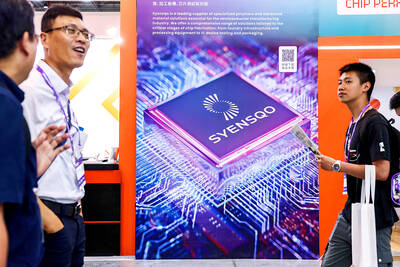Asustek Computer Inc (華碩) aims to expand its share of Indonesia’s smartphone market to 18 percent next year by shipping 5 million handsets annually, a company executive said.
Chief executive officer Jerry Shen (沈振來) said Asustek’s smartphone shipments to Indonesia would total 4 million units this year, securing it a 15 percent share in the nation’s smartphone market and making it the second-largest smartphone supplier.
“Our goal is to overtake Samsung’s [Electronic Co] market position by 2017,” Shen told reporters on the sidelines of Asustek’s smartphone launch in Jakarta, on Thursday.
Samsung is the No.1 smartphone company in the nation with 25 percent market share.
Shen said the launch of Asustek’s four ZenFone 2 models in Indonesia was delayed by a government policy enacted in August, which requires all 4G devices be manufactured locally.
To comply with the new policy and meet local demand, Asustek started working with an Indonesian original design manufacturer and began sourcing components from local companies this quarter.
Indonesia is Asustek’s largest smartphone market, as an estimated shipment of 4 million handsets to the nation accounts for 20 percent of Asustek’s annual shipment target of 20 million units this year, Shen said, adding that the shipments to Indonesia were almost equal to the shipments to Thailand, Vietnam, Malaysia and the Philippines combined.
Regarding the company’s smartphone strategy in Southeast Asia, Shen said consumers in the region prefer shopping at brick-and-mortar stores instead of e-commerce sites.
He said Asustek was able to climb to top positions in the region because it has expertise in traditional sales methods.
Asustek is upbeat about the smartphone market’s growth potential in Southeast Asia and expect to ship a total of 10 million smartphones to Indonesia, Thailand, Vietnam, Malaysia and the Philippines next year.
Shen on Nov. 11 told investors that the company aims to ship 30 million smartphones next year; an increase of 50 percent from this year’s estimate of 20 million units.

SEMICONDUCTOR SERVICES: A company executive said that Taiwanese firms must think about how to participate in global supply chains and lift their competitiveness Taiwan Semiconductor Manufacturing Co (TSMC, 台積電) yesterday said it expects to launch its first multifunctional service center in Pingtung County in the middle of 2027, in a bid to foster a resilient high-tech facility construction ecosystem. TSMC broached the idea of creating a center two or three years ago when it started building new manufacturing capacity in the US and Japan, the company said. The center, dubbed an “ecosystem park,” would assist local manufacturing facility construction partners to upgrade their capabilities and secure more deals from other global chipmakers such as Intel Corp, Micron Technology Inc and Infineon Technologies AG, TSMC said. It

People walk past advertising for a Syensqo chip at the Semicon Taiwan exhibition in Taipei yesterday.

NO BREAKTHROUGH? More substantial ‘deliverables,’ such as tariff reductions, would likely be saved for a meeting between Trump and Xi later this year, a trade expert said China launched two probes targeting the US semiconductor sector on Saturday ahead of talks between the two nations in Spain this week on trade, national security and the ownership of social media platform TikTok. China’s Ministry of Commerce announced an anti-dumping investigation into certain analog integrated circuits (ICs) imported from the US. The investigation is to target some commodity interface ICs and gate driver ICs, which are commonly made by US companies such as Texas Instruments Inc and ON Semiconductor Corp. The ministry also announced an anti-discrimination probe into US measures against China’s chip sector. US measures such as export curbs and tariffs

The US on Friday penalized two Chinese firms that acquired US chipmaking equipment for China’s top chipmaker, Semiconductor Manufacturing International Corp (SMIC, 中芯國際), including them among 32 entities that were added to the US Department of Commerce’s restricted trade list, a US government posting showed. Twenty-three of the 32 are in China. GMC Semiconductor Technology (Wuxi) Co (吉姆西半導體科技) and Jicun Semiconductor Technology (Shanghai) Co (吉存半導體科技) were placed on the list, formally known as the Entity List, for acquiring equipment for SMIC Northern Integrated Circuit Manufacturing (Beijing) Corp (中芯北方積體電路) and Semiconductor Manufacturing International (Beijing) Corp (中芯北京), the US Federal Register posting said. The